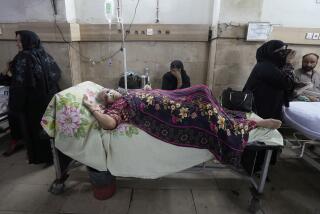2 killed as Basra residents erupt over electricity shortage
- Share via
Reporting from Baghdad — Iraqis are sweating and grumbling through their eighth consecutive season of scorching heat since the U.S. invasion with only a few hours of electricity every day — and, now, without a new government to resolve the inexplicably chronic problem.
Without fans or air conditioning, sleep becomes an impossible, sweat-drenched dream. Water, stored in rooftop tanks that soak up the sun, runs hot through the taps, if it runs at all. And as the temperature soars well into triple figures, tempers also are rising.
Those frustrations erupted violently Saturday on the streets of the southern city of Basra. As people protesting prolonged electricity outages pelted the provincial government headquarters with rocks, police opened fire to disperse them, killing two and injuring four.
It was the first, but perhaps not the last, instance of civil unrest this year over the country’s chronic electricity crisis.
The violence offered an ominous indicator of a broader dissatisfaction taking hold across the country as Iraqi politicians drag their bickering over the formation of a new government into a fourth, and unusually hot, month.
The Basra demonstrators beat their heads against a black-draped coffin emblazoned in white with a single word: “Electricity.” On the streets of Baghdad, a series of freshly painted banners appeared on street corners giving voice to the question on the lips of every Iraqi.
“To the Electricity Minister,” they read. “Where is the Electricity?”
“What’s their problem?” fumed Baghdad store owner Haidar Hussam, 27. “Why, after seven years, can’t they give us electricity?”
It’s a question no one in the Iraqi government seems able to answer. The electricity minister this month promised an increase in power by mid-June to nine hours a day, from an average of six. Instead, the supply shrank.
The U.S. government has spent $4.9 billion on electricity improvements since 2003, and the Iraqi government has committed billions more, though it isn’t clear how much has actually been spent. Yet figures published by the U.S. State Department show that electricity production in the first week of June was 1% lower than a year ago, and that supply met 61% of demand, compared with 71% a year earlier.
With most areas of Baghdad reporting a maximum of four hours of electricity a day, however, those figures would appear to be optimistic, at best. Electricity officials in northern Nineveh province say supply is meeting only a third of demand. Residents of the former insurgent stronghold of Anbar province report receiving only two hours of power a day.
And even that power isn’t delivered with any continuity.
“It comes on for 15 minutes, then goes off for half an hour, then on for five minutes, then off for an hour,” grumbled sandwich vendor Sajad Adnan, 22. That’s not long enough to cool a room, or run a wash cycle, or even chill a bottle of water.
Iraqis who can afford it have adapted over the years by subscribing to a private neighborhood generator supplier. But those generators are for the most part too feeble to power more than simple fans, TVs and lights. Air conditioners are out of the question. And the generators can’t run for more than a few hours at a time, so some people also buy small generators for the times when the neighborhood generator is cooling off.
All that is expensive.
“It’s a domino effect,” said Haider Abid, 55, a household goods seller whose business has plummeted in recent weeks. People are spending so much of their income on trying to keep cool that they don’t have cash to spend, he said.
The problem is compounded by the failure of the politicians to agree on a new government. New contracts are not being awarded, new hires are not being made, and the flow of cash into the economy has halted.
Reflecting official concern that the unrest could spread, Prime Minister Nouri Maliki issued a statement Saturday appealing for calm, and promising to investigate the problem in Basra.
He also pledged to “call to account” those in the Electricity Ministry who had not lived up to their promise to increase the supply.
He did not, however, promise to actually increase the supply.
Times staff writers Nadeem Hamid and Usama Redha in Baghdad, and special correspondents Othman Ghanim in Basra, Nawaf Jabbar in Ramadi and Omar Hayali in Mosul contributed to this report.
More to Read
Sign up for Essential California
The most important California stories and recommendations in your inbox every morning.
You may occasionally receive promotional content from the Los Angeles Times.










